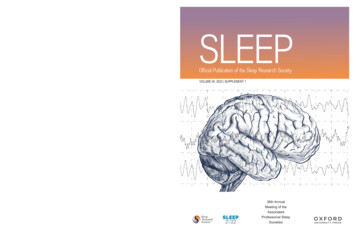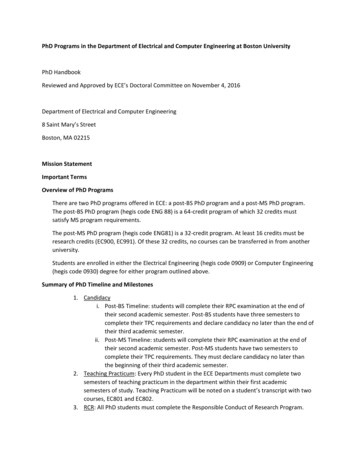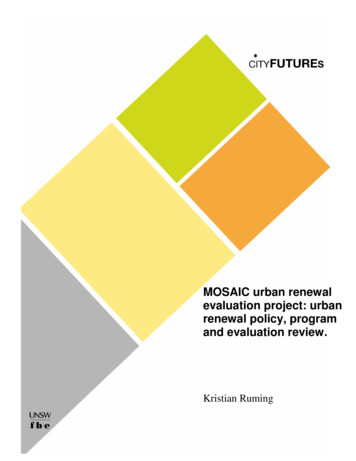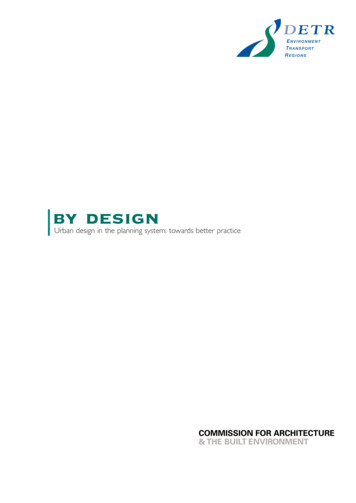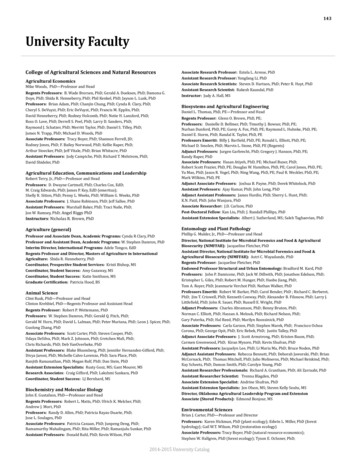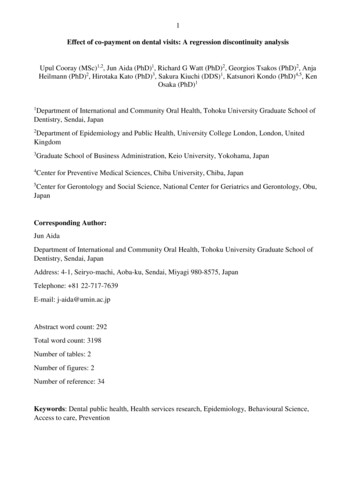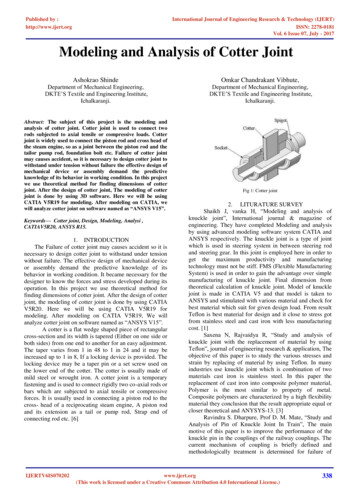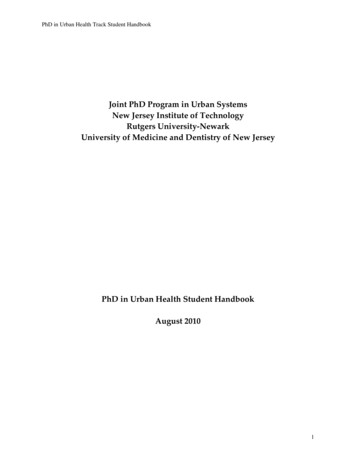
Transcription
PhD in Urban Health Track Student HandbookJoint PhD Program in Urban SystemsNew Jersey Institute of TechnologyRutgers University‐NewarkUniversity of Medicine and Dentistry of New JerseyPhD in Urban Health Student HandbookAugust 20101
PhD in Urban Health Track Student HandbookDear Urban Health Students:This Doctoral Student Handbook for the PhD Program in Urban Health has beencompiled to help students understand and function in three complex and sometimesperplexing academic systems: New Jersey Institute of Technology‐Rutgers University,Newark‐University of Medicine and Dentistry of New Jersey. In particular, UMDNJ‐specific policies as the Urban Health Specialty is housed in the School of Nursing atUMDNJ.This PhD Program in Urban Systems is the first cross‐sectoral doctoral program in thesocial sciences to draw upon the combined strengths of New Jerseyʹs three senior publicresearch universities. Students enjoy the rich resources of the partner institutions,including faculty, research programs, libraries, and computer facilities. In addition,Newark ‐ a rich, multicultural urban environment ‐ serves as the host community forthe program. Northern New Jersey and the Greater Metropolitan Area provide anatural laboratory in which students may pursue challenging research opportunities.The current program has a 72‐credit curriculum with four specializations: (a) urbanhealth, (b) urban environments, (c) urban educational policy, and (d) urbanarchitectural history. Program faculty have academic expertise in a broad range ofdisciplines, including the social sciences (anthropology, sociology, psychology andpolitical science), architecture and urban planning, education, nursing and other healthdisciplines, and research and statistical methods.The policies and procedures herein are subject to change and may be superseded byaction of the Program Director and the faculty. When such change occurs, updatedinformation will be provided in the form of substitute pages and you will be notified byemail. The updated web page will also reflect the change.Urban Health students should visit the following PhD program web pages foradditional information:2
PhD in Urban Health Track Student HandbookUMDNJ School of Nursing, PhD program mNew Jersey Institute of Technology Web SiteUrban Systems Web SiteNew Jersey Institute of Technology Graduate CatalogRutgers University Urban Educational Policy CatalogIf you have any questions about material in this handbook, please feel free to contactany of us:Karen A. Franck, PhDProgram DirectorUrban Systems and Urban Architectural HistoryDula F. Pacquiao, EdD, RN, CTNProgram CoordinatorUrban HealthAlan Sadovnik, PhDProgram CoordinatorUrban Educational Policy3
PhD in Urban Health Track Student HandbookOVERVIEW OF DOCTORAL PROGRAMThe Doctor of Philosophy (PhD) Program in Urban Systems is a jointly sponsoredprogram of the University of Medicine and Dentistry of New Jersey (UMDNJ)‐Newark,Rutgers‐The State University of New Jersey, Newark, and New Jersey Institute ofTechnology (NJIT). The program is designed to generate new and refinedinterdisciplinary knowledge based on a cross‐sectoral framework of urban systems. Itspurpose is to prepare scholars, researchers and administrators who will advance thetheoretical and empirical basis for urban systems practice and provide visionaryleadership to the fields of health, education and the environmentUnderlying BeliefsThe program is built upon the unique strengths of New Jersey’s three senior publicresearch universities. The mission of the program is to prepare experts to develop aknowledge base in urban systems, which are grounded in research, and to participate inthe development, implementation, analysis and evaluation of policy and services forurban populations. Graduates of this program are expected to have a positive impacton urban residents as well as the systems and policies that affect them.The objectives of the Joint PhD Program in Urban Systems are to educate researchers to:1. develop a knowledge base in urban systems through original research,2. incorporate knowledge that is derived from the social sciences intoresearch that is relevant to urban services, planning, and policy,3. draw upon relevant conceptual frameworks of the social sciences andhumanities to improve urban public and community life, and4. initiate, facilitate and participate in collaborative endeavors related to thetheoretical, conceptual and practical aspects of urban systems andpopulations.PROGRAM OF STUDYThe program is a minimum of 72‐credit curriculum with four specializations: (a) urbanhealth, (b) urban environments, (c) urban educational policy, and (d) urbanarchitectural history. Specific full‐time and part‐time curriculum plans are tailoredthrough advisement to facilitate academic progression. Program faculty have a widerange of academic backgrounds, including the health sciences, public administration,political science, economics, planning and policy, humanities and social sciences,4
PhD in Urban Health Track Student Handbookarchitecture, history, management, information systems and computer science andstatistics.The program has four components: 18‐credit program core, 12‐credit research core, 18‐credit specialization core, and 24‐credit dissertation advisement and preparation.The core curriculum provides students with the opportunity to build upon theiracademic and experiential backgrounds through foundational courses in urban health,urban environment and urban education. Core courses offer opportunities to gainknowledge and strong understanding of the issues, assumptions, theories and methodsof urban education, environment, and health. The core research courses build onprevious research knowledge and expand the scope and breadth of research design andstatistical methods.GENERAL REQUIREMENTSMinimum Credits RequiredRequirements for a doctor of philosophy are a minimum of 72 credits beyond thebachelor’s degree. Students are required to complete a minimum of 48‐semester creditsbeyond an appropriate prior master’s degree. These students entering with a Master’sdegree in an unrelated area will have credit requirements evaluated on a case‐by‐casebasis but will have to complete at least 48 credits beyond the master’s degree. Graduatecredits earned at other institutions may be offered in partial fulfillment of requirementsfor the doctoral program in urban systems. Courses offered for transfer credit areevaluated individually by the Program Coordinator and in collaboration with the PhDFaculty Admissions Committee relative to Graduate School requirements, programrequirements and the student’s Plan of Study.In addition to the overall credit requirements, the Urban Health specialization includesthe following minimum requirements: For those entering the program with a master’s degree, 48‐credits of coursework beyond the master’s degree of which at least 12 credits must be at thedoctoral level. Students, who wish to complete a master’s degree while pursuing adoctorate, must apply for admission to the master’s program, and satisfy allrequirements for the master’s degree, including any thesis or projectrequirements.Students who are entering with a bachelor’s degree or unrelated master’s degreemay have a program study plan that is similar to the following requirements:5
PhD in Urban Health Track Student HandbookCourse RequirementsCore CoursesResearch Core CoursesSpecialization CoreCourses/ElectivesDissertationCourse Credit Sequence (minimum)18121824Total Credits forGraduation72 creditsThe Program Coordinator will review transcripts with newly admitted studentsentering with an appropriate prior master’s degree to establish a study plan. Studentsmay request course credits from their master’s degree be considered to establish theirPlan of Study when their master’s level courses are comparable in content and focus tothe courses in the Urban Systems core. A student’s Plan of Study with a relatedmaster’s degree may typically have the following requirements:CourseRequirementsCore CoursesResearch ertationAdvisementTotal Credits forGraduationCourse CreditSequence18Taken as partof Program ofStudy0Credit forMaster’s levelprogram181293181824247248Doctoral Qualifying ExaminationStudents should take and pass the qualifying examination within 3 years of beginningthe program. Students are permitted to take the examination twice. Within onesemester of completion of all core courses (including all research core courses), eachstudent will take the one‐day written examination and the one‐week take‐home section.6
PhD in Urban Health Track Student HandbookResearch Proposal SubmissionDoctoral students are required to select a Dissertation Advisor, form a dissertationcommittee, and receive approval of a research proposal within one year of passing thequalifying examinations.Doctoral CandidacyDoctoral candidates are students who have completed all other requirements for thePhD degree except for completion of the dissertation and the dissertation defense. Thisincludes, as a minimum, passage of the doctoral qualifying examination, approval ofthe research proposal and completion of all course work. Status as a doctoral candidatedoes not imply candidacy for the degree.Length of Time to Complete RequirementsThe student has a maximum of 7 years within which to complete the degree. Ifextenuating circumstances occur, permission can be sought for an extension.Students in the Urban Health Track should obtain permission from the ProgramCoordinator and Assistant Dean of Graduate Studies based on the recommendation bythe Chair of the student’s dissertation advisor.Cumulative Grade Point AverageStudents must maintain a minimum cumulative grade point average of 3.0 (on a scale of4.0 scale) throughout the program. Some forms of financial support may require ahigher grade point average. The Program Director is responsible for evaluating theprogress of each student at the end of the semester of study. The Assistant Dean forGraduate Studies Office at UMDNJ is also notified if a student’s academic status is injeopardy.PLAN OF STUDYEach student works collaboratively with the Program Coordinator to create a Plan ofStudy that constitutes a unified program that fits within the framework of the doctoralprogram requirements and meets the student’s research interests and career goals. ThePlan of Study (Proposed Plan of Study Form) is approved by the Program Coordinatorprior to the student’s registering for elective and/or specialty courses. The Plan of Studyis reviewed with the student after 18 or more credits have been completed. The majorcomponents of the doctoral program are: 18‐credits of Program Core Courses:12‐credits of Research Core Courses:7
PhD in Urban Health Track Student Handbook 18‐credits of Urban Systems Specialization Courses Urban Health Urban Environments Urban Educational Policy24‐credits of Dissertation AdvisementEach student must complete an independent original research project to becommunicated in a written dissertation. The research must address a question ofsignificance to urban systems.COURSE DESCRIPTIONSRequired Program Core Courses (18 Credits):Urban Systems I: Evolution of the American Metropolis (3 Credits)Urban Systems I encompasses the growth and development of American communitiesfrom early stages of European settlement to the present, with emphasis on the latenineteenth and twentieth centuries. It examines the historical evolution of cities,including the social, demographic, political and economic forces which shaped them.The primary unifying theme is the expanding role of government over the latenineteenth and twentieth centuries, including public sanitation, health, education andcity planning. The course will strive to develop a historically based conceptualfoundation on which to ground studies of contemporary issues and concerns in urbanhealth, urban environment and urban education. In this regard it will consider factualand descriptive elements of urban and metropolitan history as well as examination of anumber of theoretical and explanatory theses. For example, the transition fromJeffersonian and Jacksonian notions of laissez faire capitalism to the Keynesian conceptsof the social welfare state will be investigated. A fundamental pedagogical purpose ofthe course is to instill in doctoral students an effective grasp of the ways in whichhistorical scholarship informs our knowledge of the contemporary dynamics of urbanand metropolitan growth and change.Urban Systems II: The Development of U.S. Urban Populations and Trends (3 credits)The overriding goal of this course is to provide Urban Systems doctoral students with asocial science based understanding of the past, present and future of today’sdemographically and culturally diverse population in the U.S. cities. The course buildson prior content provided in Urban Systems I. At the core of the course are the affluenturbanites, migration, culture, politics and economics. The focus is on the micro‐levelphenomena (including crime, the “code of the street”, neighborhood politics andcommunity building) and how these relate to the macro‐level factors (economics,8
PhD in Urban Health Track Student Handbookpolitical and ideological). The course examines how culture, migration, civil rights andwelfare policies, and economics have influenced the demographic composition ofAmerican cities and the capacity of city residents to create and maintain vital andproductive places to live.Urban Systems III: Globalization, International Migration and Contemporary Cities (3Credits)This course examines the process of globalization and how it affects both the form andfunction of cities worldwide. Since 1970’s, globalization has affected major changes inthe world in forms of technology, communications, and function of cities. While similarphysical, cultural, and social patterns have been developed in cities around the world,there have also been new and distinct cultural and economic spaces that have beencreated in various global cities. Based on historical, economic, and sociological analysis,this course will compare globalization process in cities from countries in Africa, Asia,and the Americas. It will investigate what characteristics of globalization affect cities,how they operate in historical context, and what benefits and harms they produce incontemporary cities. Using theories developed in fields such as history, sociology,political science, urban studies, health, and architecture, we analyze where, why andhow such new globalization patterns emerge. Moreover, the course will explore andcritique the impact of globalization on cities as well as investigate policy implicationsfor improving the housing, health, and education systems in global cities.The Good City: Environmental Design and The Quality of Metropolitan Life (3 credits)As we move into the 21st century, the “good city” is as illusive as ever. Yet now,planners, architects, urban designers and many citizens recognize that what was oncedeemed good, and was widely built, has generated serious problems. For example,neither low density, single‐use, residential suburbs dependent on the automobile norhigh density residential towers in urban open space have proved to be the ideasenvisioned. Why is that? Why were they considered good? What are the alternatives?And what are other aspects of the “good city” that are being proposed andimplemented today? In addressing these questions, it is essential to examine the goalsand values that always shape both our vision of the good city and our critiques of thevisions of others.The purpose of this course is to introduce all Urban Systems doctoral students to thevarious ways in which architects, urban designers and planners have sought to improvethe quality of everyday life in urban and suburban environments through the design ofthe built environment, both at the scale of neighborhoods and communities and at thescale of buildings. The emphasis is on the manipulation of built form, transportation,and public space as responses to perceived problems. Key topic areas are housing and9
PhD in Urban Health Track Student Handbookneighborhoods, public space, schools, hospitals, transportation. Students will come tounderstand what problems were recognized, the design solutions proposed and /orimplemented, and the critiques and consequences that ensued.Determinants and Consequences of Urban Health (3 Credits)This interdisciplinary course examines the complex interactions among the physical andsocial environment, health status, education, and human capital in the community.Quality of life is the outcome of micro and macro‐factors that operate at the level of theindividual, family, neighborhood, community, state and nation. A multidisciplinaryframework is used for examining the evidence on the linkage between quality of life,development of human capital, poverty, sociopolitical organization and communityorganization. Students are expected to: (a) Synthesize anthropological and sociologicalperspectives on health and illness; (b) Analyze epidemiological concepts within thecontext of social science perspectives; (c) Evaluate the state of health disparities innational and global contexts; (d) Describe macro‐ and micro‐level factors that influencethe health of individuals and communities; (e) Examine theoretical perspectives on thehealth of individuals and communities; and (f) Examine the effects of poor health on thedevelopment of human capital and community.Urban Educational Systems: Schools & Communities in the Contemporary World(26.977.608 3 Credits)This course provides an examination of urban educational systems both in the UnitedStates and internationally. Focusing on the organizational structure and processes ofurban schools and districts, the course examines the ways in which educational systemsaffect students living in cities. Using sociological, historical, political and economicanalyses, students will explore the interrelationship among educational, political,economic, and cultural systems. This course will analyze how urban education isrelated to larger structural processes such as de‐industrialization, globalization,immigration, and demographic changes. Finally, students will explore how federal andstate policies and legislation affect urban education.Required Research Core (12 Credits):Research Seminar I: Qualitative Research (3 credits)The purpose of this course is to introduce doctoral students to the philosophy andmethods of qualitative research. Through an examination of the evolution of qualitativemethodology, the various forms of qualitative research, the ways to conduct qualitative10
PhD in Urban Health Track Student Handbookinquiry and examples of various qualitative methods, students will understand how toconduct qualitative inquiryResearch Seminar II: Quantitative Methods (URB 6103, 3credits)This is an advanced course in quantitative, social science research methods. Together,the students and instructor critically examine a large number of peer reviewed journalarticles with the goal of enhancing the student’s understanding of the logic andapplication of quantitative research methods.Additional research course: Advanced Quantitative or Advanced Qualitative Researchor Geographical Information Systems (3 credits)Geographical/land information systems GIS/LIS is a computerized system capable ofstoring, manipulating and using spatial data describing location and significantproperties of the earth’s surface. GIS is an interdisciplinary technology used forstudying and mapping land use issues, land resource assessment, environmentalmonitoring and hazard/toxic waste control. Introduces this emerging technology andits applicationResearch Elective By Advisement (3 Credits)URBAN ENVIRONMENTS SPECIALIZATION COURSES(18 Credits: 9 Required as noted below and 9 Credits of Electives)Urban Forms in HistoryThis course examines two essential urban spaces, the street and the square, from Greekantiquity to the 1950s. It is not a comprehensive survey, but a focus on case studiesdrawn from European and American cities and arranged chronologically. Althoughform analysis will constitute the core of our discussions, historical, social, political,economic, and cultural issues will also be investigated. We will be concerned with themeanings behind the particular urban elements, as much as their physical, operational,and functional aspects within the greater format of the city. Hence, we will considerspecific streets and squares within the matrix of the overall urban structure.Throughout, references will be made to contemporary urban design theory andpractice.The first step is the familiarization with general literature and approaches to the studyof these urban elements. We will then focus on case studies. Students will choose11
PhD in Urban Health Track Student Handbooksample streets and squares from the cities listed in the syllabus and analyze themthoroughly. They are expected to generate and lead class discussions.Elements of Infrastructure Planning (3 credits)This course provides an introductory survey of the basic principles, operation anddesign of physical infrastructure systems including roads, public transportation,community facilities, public open space, surface drainage, and electric, gas, water, wastedisposal and telecommunications services.Architectural Perspectives in Urban Research (3 Credits)This course focuses on the description and application of a variety of research methodsused in architectural and urban research. Our purpose is to understand these methods, tolearn to use them and to evaluate their use by others. While the focus is on the methodsthemselves, they can only be fully understood by also considering the conceptualframeworks and assumptions from which they arise and the kinds of findings andinterpretations they produce. The methods thus become a kind of lens for looking intothese other domains and, accordingly, for gaining insight into some of the theorized andthe documented interconnections among people, daily life, architecture and urbansettings. It is intended that students will use the material in it, particularly the courseproject, to develop dissertation topics and approaches.URBAN EDUCATIONAL POLICY SPECIALIZATION COURSES(18 Credits: 9 Required as noted below and 9 Credits of Electives)Sociology of Urban Education (3 Credits)This course provides an examination of the contributions of the sociology of educationto understanding urban educational problems and urban school improvement.Beginning with the classical theoretical traditions of the field, functionalism, conflicttheory, and interactionist theory, and empirical research in the field, students explorehow sociological theory and research has contributed to the analysis of urban schooling,with specific reference to issues of race, class, gender and ethnicity.History of Urban Education (3 Credits)This course provides an examination of the history of urban education in the UnitedStates. Through an exploration of the development of urban school systems in the late19th and early 20th centuries, through the rise and decline of urban schools by the 1960s,to the development of urban educational policies designed to improve urban schoolsfrom the 1990s into the 21 century, the course provides a historical foundation forunderstanding urban educational policy. Among the topics discussed are: theurbanization of city education; the rise of bureaucracy and scientific management; the12
PhD in Urban Health Track Student HandbookProgressive Era and urban education; suburbanization and its effects on urban schools;desegregation and urban schooling; de‐industrialization and its effects on urbanschools; issues of equity versus excellence; urban educational reform from the 1990s topresent; issues of race, class, gender and ethnicity in historical perspective.Urban Educational Policy and School Improvement (3 Credits)This course provides an overview of major issues and controversies in urbaneducational policy. Through a historical, sociological, and political analysis ofeducational problems, the course explores a variety of policy initiatives and reforms,including curriculum and learning standards, school choice, tuition vouchers, charterschools, privatization, and whole school reform. Through an analysis of case studies ofurban Abbott districts in New Jersey, including the three state take over districts, JerseyCity, Paterson, and Newark, this course provides prospective administrators with anunderstanding of the complexities of urban school reform and improvement.URBAN HEALTH SYSTEMS SPECIALIZATION COURSES(18 Credits: 9 Required as noted below and 9 Credits of Electives)Urban Health Systems: History, Structure and Challenges (3 Credits)This course focuses on social and political forces in the development of urban healthsystems, primarily in the United States. The course is organized into three major sectors:the development of the health care system, critique of the health care system, and keyissues in urban health. Beginning with a survey of historical forces leading to thecreation of the current system, the course focuses on concepts derived from sociology,political science and economics that facilitates the analysis of current issues in theorganization, structure and functioning of the current system as well as the outlook forthe future. Such concepts include but are not limited to professionalization anddeprofessionalization, social stratification, power, professional dominance, devianceand social control. Current issues such as inequality in access to health care, distributionof health manpower, quality and funding of health care institutions, and the impact ofchanges in population size, distribution and structure will be used to illustrate and testbasic theoretical understandings and approaches.Social and Cultural Construction of Health and Illness (3 Credits)This PhD level seminar describes the social and cultural factors that influence howindividuals in the U.S. organize, define and experience illness; engage in illnessprevention; seek treatment; and engage with the formal and informal medical systems.Specific course objectives include: (a) provide an introduction to anthropological andsociological perspectives on health and illness; (b) describe the social and culturalproduction of health; (c) describe how people conceptualize illnesses and make13
PhD in Urban Health Track Student Handbookdecisions concerning treatment; (d) describe major and minor folk traditions concerningthe diagnosis and treatment of illness; (e) describe the nature of interactions between“patients” and the formal and informal medical systems focusing on health carepractitioners; (f) describe the information sources that people use when confrontingillness; and (g) describe the nature of individual perceptions of risk.Urban Health Program Evaluation (3 Credits)This course is designed to provide students with a framework for understandingprogram evaluation and facilitating integration of evaluation in health servicesprograms. Content will address both the science of evaluation and topics will includegoals, methodologies, standards, and address misconceptions regarding the evaluationprocess. The emphasis is on practical, ongoing evaluation strategies that involve allprogram stakeholders, not just evaluation experts. Students are expected to: (a)describe the social and cultural context of health program development; (b)describecomponents of and steps in program development; (c) discuss appropriatetheories/models guiding program development and implementation and evaluation; (d)describe how program implementation and evaluation address macrosocial andmicrosocial process and effects; (e) identify various evaluation methods of programs; (f)analyze appropriateness of evaluation design and methods in monitoring process andoutcomes of the program; and (g) interpret evaluation data to determine programimpact, cost and decisions about the program.ADVISEMENTRole of the Program CoordinatorThe Coordinator is a vital link between the entering student and the doctoral program.The Coordinator plays an important role in orienting the student to the Joint PhDUrban Systems Program and the respective academic institutions, assisting withclarification of goals, helping the student to structure a meaningful and integratedcourse progression, and monitoring the student’s advancement in and adjustment todoctoral study. Each Program Coordinator will be responsible for PhD studentadvisement or assign specific faculty members to do so. The specific advisementresponsibilities of the program coordinator are to:a. Interpret to the student the doctoral program design, requirements andpolicies.b. Assist the student in planning objectives for doctoral study and clarifyingcareer goals.14
PhD in Urban Health Track Student Handbookc. Assist the student in planning his/her program of study in accordance withthe program requirements, individual research interests and career goals.d. Assist the student with registration procedures.e. Approve and sign, where appropriate, all registration materials, drop‐addforms and other records.f. Monitor the student’s academic progress through communication anddiscussion with faculty who teach doctoral courses, review student’s gradesand grade point averages, and meet with the student on a regular basis.g. Maintain student records, including: Advisement and progression Notation of special advisement consultations, phone calls, emails,etc. Student selection of a dissertation topic (general area for theresearch) and Dissertation Advisor.h. Forward the student’s file to the Dissertation Advisor.i. Determine the student’s readiness to take the comprehensive examination.j. Potentially serve as a member of the committee
Newark‐University of Medicine and Dentistry of New Jersey. In particular, UMDNJ‐ specific policies as the Urban Health Specialty is housed in the School of Nursing at UMDNJ. This PhD Program in Urban Systems is the first cross‐sectoral doctoral program in the
